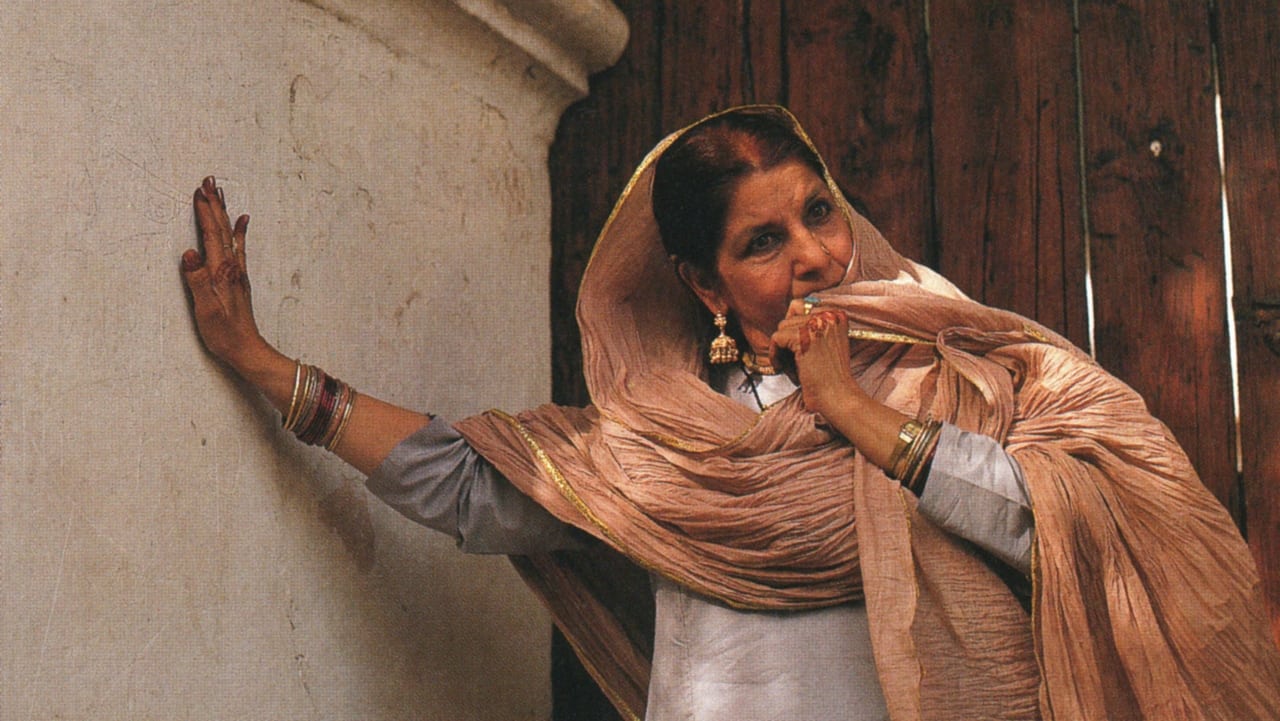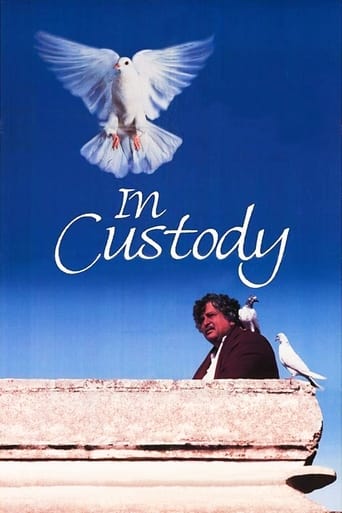



Very very predictable, including the post credit scene !!!
View MoreIt is not deep, but it is fun to watch. It does have a bit more of an edge to it than other similar films.
View MoreExcellent and certainly provocative... If nothing else, the film is a real conversation starter.
View MoreWorth seeing just to witness how winsome it is.
In Custody is Ismail Merchant's beautiful retelling of Anita Desai's novel about the death of a language and a culture as reflected in the decline of one individual. Om Puri and Shashi Kapoor play men watching, with varying degrees of remorse and resignation, the death of the Urdu language, a language of poetry, erudition and courtliness. Shabana Azmi, as Nur's (Kapoor) second wife, a courtesan and singer of ghazals, is a bridge between what is passing and the rash future. Their performances are sensitive and subtle and quietly heartbreaking. The cinematography is exquisite, making the film visually rich and haunting. There are many strong performances, and the secondary characters are well-cast. The film is more theme-driven than plot-driven, so probably not suited to every taste. One of my very favorite Ivory-Merchant offerings.
View MoreAn extremely good Indian film adapted from Anita Desai's book. It shows how India is a real laboratory for multiculturalism and at the same time it reveals a case where one culture is more or less dying in India itself because it is a minority culture based on a minority language language. Luckily it is the official language of Pakistan and this Urdu poetry is praised and appreciated in quite a few foreign countries. The film shows quite well how this old poetry finds it difficult to survive in the modern world of technology and metropolitan living. It has to be collected and saved for future generations and yet it is eroding fast. Parodies are common and the main noble themes are giving way to trite images and situations. The film though does not show the confrontation of the Hindu and Urdu cultures. It reduces the Urdu side of things to essentially the Moslem religion and it more or less entirely erases the Hindu religion. Then the discourse is no longer a discourse of exchange and sharing but rather a discourse of tolerance for the minority culture that has to come from a dominant, but neutral point of view. That's a shame in a way because the subject of the book was a lot wider and it concerned the whole world in many ways, the necessary moving away from the laicism some states preach against any religion and the indispensable adoption of a more tolerant, open and absolutely free approach of all philosophical or religious beliefs that must be granted the right to express themselves anywhere in society. Just like a man has the right to wear his color everywhere in society, a man must have the right to wear and express his beliefs everywhere in society. All dress codes and neutral-looking regulations are nothing but severe censorship if not discrimination. Yet this film is essential because it reveals a problem that is probably the most important problem to solve in the world in the coming decades: beyond tolerance how can we build a world of complete collaboration among all the different visions of the universe and life.Dr Jacques COULARDEAU, University Paris Dauphine, University Paris 1 Pantheon Sorbonne & University Versailles Saint Quentin en Yvelines
View MoreWhile this directorial debut from Ismail Merchent leaves most westerners cold and thinking this movie to be about the dying language of Urdu its a actually the study of two characters who put their love of art above everything else and their smoldering passion is captured perfectly.Important here is to note that while the subject chosen has been Urdu poetry it could have been replaced as easily by say Indian classical music and the movie would have worked just as well. Merchent tries to capture the situation of the artist and his ardent followers juxtaposing the touching sincerity of Om Puri with that of the the poet Nurs(played by Shashi Kapoor) bunch of sycophants. The film contains many local nuances which may be missed by non Indian audiences which is what makes this work a true labor of love as Merchent never tries to simplify the context or the complexity of the characterization.Great script, wonderful overall performances by the actors and a movie that truly enlarges ones world view! I am reminded of Milan Kunderas quote about Pargue -that the city is disappearing like a poem written on piece of burning paper. Merchent captures remnants of that disappearing poetry and the movie is like a slow burn on celluloid!
View MoreAnother recent DVD through the Merchant & Ivory Collection. A fair movie at best with some notable talent from a fine actor, Om Puri. The comedy picks up towards the end of the movie which is a god send since the rest of the movie is pure farce. Sadly, age has not been kind to Shashi Kapoor or Shabana Azmi and their roles are two dimensional and uninspiring. India yet again steals the show with the beauty of its architecture, glorious sunsets, and colorful people. The direction works well, and the camera seems to capture the mood eloquently. The poetry in Urdu is glorious to listen to even of delivered by Shashi Kapoor. Maybe good for a rainy day when you wish to be alone with a beer.
View More